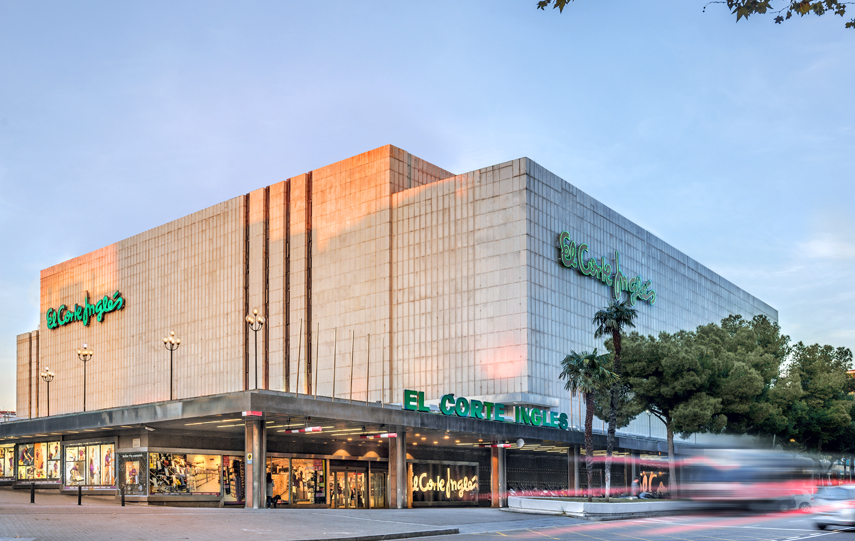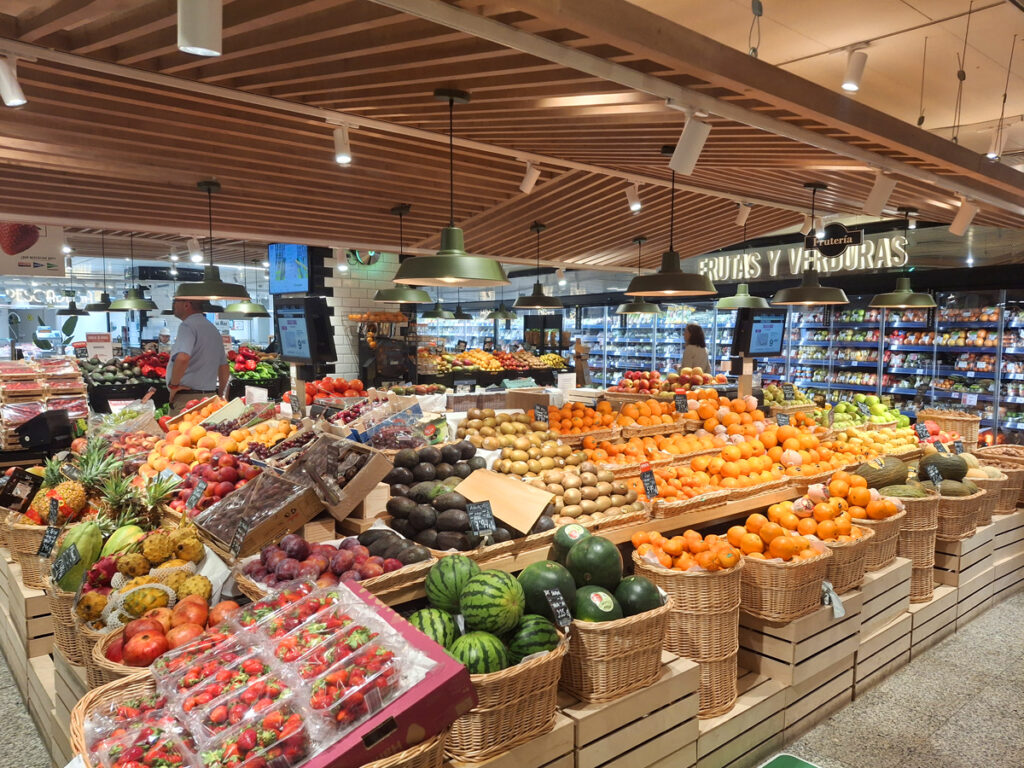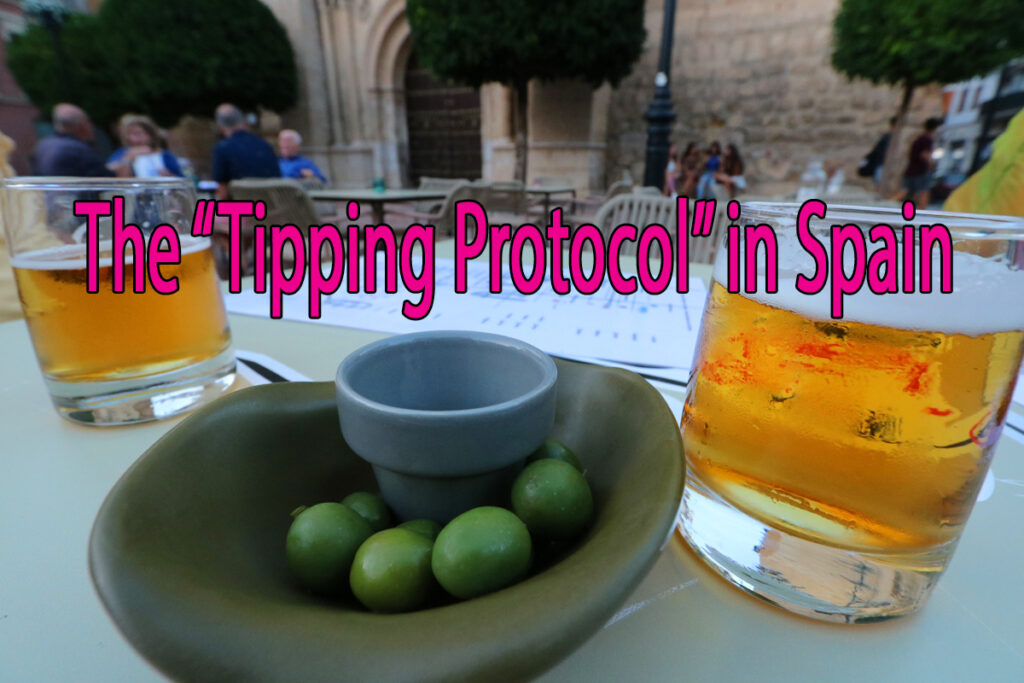Comparing Supermarkets in Spain.
What’s the best supermarket in Spain? There’s a lot of competition when it comes to supermarkets in Spain and how you define “best” depends on a lot of factors.
In this post I’ll cover the major supermarkets in Spain and list the pros and cons of each including cost, accessibility and quality. And I’ll give you my thoughts on the “best” supermarket in Spain.

Mercadona
Mercadona is by far the biggest supermarket chain in Spain with 1,632 stores and a turnover of 27.8 billion Euros (2022 statistics).
The products sold by Mercadona
Mercadona is very unique in the products it sells: much of what you see on their shelves are their private label brands: Hacendado (food), Bosque Verde (household), Deliplus (personal care), and Compy (pet products). You won’t find the variety in Mercadona that you find in many other stores. You might, for example, only find 4 different types of chips, 2 different types of tortillas, 1 type of toilet paper. They have many different cheeses: different sliced cheeses (gouda, edam, mozzarella), blocks of cheddar cheeses, feta cheese, cottage cheese…but these are all Hacendado brands and you won’t find any competition (for example, there’s one Hacendado feta cheese. You won’t find any other feta cheese options on the shelves). It all seems odd the first time you come to Mercadona.
Pros: As “different” as the above sounds, I think most of Mercadona’s private label brands are very good and often better than the usual brands you’ll find in other supermarkets. There’s a quality and consistency about Mercadona products that we’ve gotten used to and that we always appreciate. And you’ll find all the basic items that you need at Mercadona; besides the goods on the shelves, their stores all have a bakery section, most stores have a fish section, they all have a large fresh vegetable section, and they all have a good selection of Spanish foods. As I say, there’s not a lot of variety but you’ll find all the basics and they are of good quality.
Cons: The lack of variety really stands out. If you’re looking for something different you’re out of luck. Mercadona products are also all Spanish, there’s no international flavour to them (in fact, I can’t think of anything non-Spanish on their shelves). An example: we recently bought a Cafetera for making expresso coffee. We looked for coffee at Mercadona and bought a couple of the Spanish options they had. We didn’t think much of them, we ended up going to Corte Inglés where we bought Lavazza coffee from Italy (more on Corte Inglés later). Mercadona is not good for anything non-Spanish and their stores don’t have an International food section. They also don’t have much variety when to comes to wine or other alcohol. In fact I often find myself going to other supermarkets if looking for wine.

Cost
Mercadona is mid-priced when compared to other supermarket chains in Spain – it’s not considered a discount supermarket (like Lidl, Aldi and Dia) but it’s also not as high-end as Corte Inglés for example. Mercadona falls in the mid-range of pricing.
Quality
I’ve mentioned that Mercadona’s private label brands are good quality. I mentioned their feta cheese – after seeing “fake” feta in many other stores, I was surprised by how good their Hacendado private label feta is. I think that’s generally true of most of what they sell. But I also wanted to mention their meat and fruits/vegetable sections – everything is very fresh and unlike some other stores it just looks high in quality.
Atmosphere
Mercadona stores just present well, with large aisles, clean presentation, bright lights. Their employees are friendly and look happy which can’t be said about all supermarkets in Spain (I read somewhere that Mercadona employees are the best paid in the industry. You can tell).
Locations
This is where I think Mercadona does fantastically – you’ll find Mercadona stores all over city centers. Many competing supermarkets have their large stores on the outskirts of cities and you have to drive to get there. Not Mercadona, they are extremely well-located all over city centers all over Spain, making them the go-to place for grocery shopping for most city dwellers.
Overall
We’re big fans of Mercadona for everyday shopping. We’ve lived in 3 difference towns/cities in Spain and Mercadona was always conveniently located in each. Their stores are clean, employees friendly, basic foods of high quality, pricing decent. There’s little not to like about Mercadona.

Carrefour
Carrefour is a French company that operates 1,463 stores across Spain: Note however that there are 2 main types of Carrefour stores: there’s Carrefour hypermarket which are huge supermarket stores usually found on the outskirts of cities, they have large parking lots and might remind people of large suburban supermarkets in North America. Then there’s Carrefour Express which you’ll find in inner cities: smaller markets which sell the basics and which are “convenience priced” (my term, meaning you’ll pay a bit more because you’re going in there for convenience and not so much to do a large shopping).
Overall, Carrefour is ranked 2nd in terms of supermarket market share in Spain.
The products sold by Carrefour
Unlike Mercadona, Carrefour is your typical supermarket selling many products and many different brands. They have their own private labels (which are good value) but you’ll find a lot of variety and competition of brands. In the Carrefour hypermarkets you’ll even find other stuff: an electronics section, a garden furniture section, a clothes section, a bakery and fish section…really, the hypermarkets are huge and make me think of Costco in North America.
Pros: You can find anything in their hypermarkets. There’s an international section where you can find Asian and Mexican products (for example), there’s a Bio section where there’s a huge selection of healthy options. Really, it’s huge and you can find just about anything you need for all your shopping needs.
Cons: In terms of products there’s really nothing to complain about. Their hypermarkets are just really huge stores and you can find just about everything you need.

Cost
Carrefour is known to be in the higher range when it comes to pricing in Spain. Not significantly, but slightly. But their private brands as I say do have good value.
Quality
Personally, I find a difference between their hypermarkets and their Express markets when it comes to quality. When I talk quality, I refer principally to the freshness factor of fruits, veggies and meat: I’ve found the quality high in the hypermarkets and a little less so in the Express locations where veggies and fruits can look tired. You might have had different experiences but those are mine.
Atmosphere
The hypermarkets are huge and, as I say, remind me of Costco in North America. It’s the kind of place where you go for your once-a-week shopping, get a huge cart, fill it up and load up the car. While they are very convenient to fill up, I actually hate these kinds of places – I hate shopping and I know if Lissette says “Let’s go to Carrefour” that we’ll be there for hours walking up and down the aisles for stuff. Their stores are almost too big.
Locations
The hypermarkets are often in shopping malls on the outskirts of the city. They’re big, so they require lots of building space and lots of parking space. They are much more suited for suburbanites who drive there, park their car and go shopping. The Express locations are in the city and are more accessible…but they cater more to people looking for something specific rather than for a larger shopping trip (as mentioned up above, Mercadona is the go-to for most people living in cities).
Overall
Carrefour is excellent if you have a car and are looking to load up your car with a week’s worth of groceries. They have lots of variety, you can basically find anything you need. But if you live in the city you might find going to Carrefour a bit inconvenient. For us who don’t have cars, it’s the main reason we don’t make it to Carrefour more often.

El Corte Inglés
El Corte Inglés are the department stores found in most cities – they have an estimated 360 stores in Spain.
Within the Corte Inglés department store you’ll find a floor where there’s a supermarket. It’s definitely higher end, within that there’s also a section apart called “Club del Gourmet” where to can get the fanciest gourmet products from all over Europe.
The products sold by El Corte Inglés
Corte Inglés sells many of the same products you’ll find at other supermarkets, but where they do well is international products: I mentioned earlier buying Lavazza coffee there. Another thing I like to buy there is Pita bread (very hard to find in Spain. I use them for homemade pizza). Really, they sell international products that you won’t see in many other supermarkets.
They also have a great alcohol section with a great variety of wines. And sometimes you can get really good deals on a 2nd bottle of the same wine. A large bakery section, large sections for meat/fish, and a section for some very nice looking pre-prepared meals.
Pros: specialty products you can’t find anywhere else.
Cons: Cost…(below)

Cost
Corte Inglés really inflates their prices, it’s expensive. Descriptions I’ve read: “Gourmet luxury supermarket”, “Spanish snob high class supermarket”. Both are accurate.
Quality
Very high quality, everything is fresh and packaged in an appealing way.
Atmosphere
Clean, wide aisles, nice product displays, exciting bakery and meat sections. Everything looks really good…
Locations
Corte Inglés are usually located right in the center of the city making them very convenient for urbanites.
Overall
I once went to their Club del Gourmet and ordered a chunk of Emmenthal cheese. 22 Euros!! That’s the most I’ve ever paid for cheese. It wasn’t even very big. So I’m now very, very careful when I go to Corte Inglés not to buy anything by weight or portion where I don’t know how much the final pricing will come to.
It’s great to buy specialty things, the last time there I bought my mother some French chocolates in a moulded metal box (23 Euros). If you need to get someone a gift for a special occasion then I would suggest Corte Inglés.
But I would never recommend Corte Inglés for everyday shopping. It’s just too expensive, even common every day items are more expensive than in any other supermarket. In our case, we’ll go there for things that we can’t find anywhere else: things like Italian coffee, Pita bread…and I’ll always look at their wines.

Lidl
We haven’t had many experiences with Lidl in Spain so I’ll be brief in this description.
This German Supermarket ranks 4th in terms of number of stores (635 in Spain) and is known for its cheap pricing.
The products sold by Lidl
Lidl sells the usual stuff that the majority of supermarkets sell, but they are known for their private labels (including Vemondo, a vegan and vegetarian private label). As much as 80% of what you see on the shelves can be private labels, it’s how they keep prices low. Lidl has a good selection of both domestic and international products and I’ve heard good things about their Bakery section which has a good variety.
Pros: Lots of international selection as well as the Spanish usuals.
Cons: Because so much of their products are private label, you won’t find the variety that you’ll see at some other supermarkets (Carrefour for example).

Cost
Lidl is known for its low cost, among the cheapest in the industry.
Quality
I’ve heard reports of moldy fruits and vegetables and unappetizing tough meat. I don’t have much first-hand experience with Lidl. I’d be curious what regular Lidl customers have to say about that.
Atmosphere
Lidl is no frills, you’ll often see products stacked in the carton boxes they were shipped in.
Locations
Location is why we don’t go to Lidl – their stores are usually away from city centers and require a car to get to. The stores are big and have large parking lots.
Overall
When we lived in Nerja we had a Lidl on the outskirts of town which we visited a few times. We were looking for some vegetarian products (which we found). But otherwise we weren’t inspired and it was a bit of a hike from town so wasn’t convenient at all…
A good place if you have a car and want to save money. But not convenient for people living in city centers who don’t have a car.

Other Supermarkets
There are many other supermarkets in Spain, some of which are very regional, some which are smaller. Some thoughts on those below:
Aldi. Another discount supermarket, they have medium-sized stores in city centers. Comparable in many ways to Lidl (on the cheaper end, no frills, private labels). Products don’t look fresh. Aldi for me really at the bottom of the barrel when it comes to supermarkets here in Spain.
DIA. Quietly, DIA is one of the largest supermarket chains in Spain and actually has 2,766 stores in Spain (2022 figures) making it the supermarket with the largest number of stores. I say “quietly” because Dia stores are medium-sized and maybe don’t make the impression that Mercadona or Carrefour stores do. They specialize in convenience (ie stores in urban areas) and are considered in the low-priced category in competition with Lidl and Aldi.
Mas. Mostly found in Andalusia, Mas is a basic grocery store selling all kinds of products. We have one right across from our Mercadona and will go there if we want to get wine (they have a better variety of wines than Mercadona) or brands that we can’t find at Mercadona (Dr. Oetker Pizza for example). Their fruits/veggies don’t seem fresh and generally it lacks the nice aesthetic of Mercadona.
Eroski and AlCampo. Two large supermarket chains which we have had zero experience with. Eroski ranges from the huge hypermarkets to smaller stores in city centers. AlCampo has hypermarkets in the suburbs and like Carrefour sell more than just food.
So what is the best Supermarket in Spain?
Really, it depends what’s important to you and how you get around etc.
For us, Mercadona is the best supermarket in Spain. We’re city people without a car and we have 3 Mercadonas within a 15 minute walk. We don’t like shopping and Mercadona takes the hassle out of shopping. Their supermarkets are customer-friendly, their food is fresh and of good quality, and their pricing good. We can get all of our shopping done quickly. It’s the place for all of our basics*.
*If we had a car we’d probably go to Carrefour for a bit more selection. We would often go there when we lived in Antequera because it was an easy bus ride from our apartment. So we’d do our basics at Mercadona but every once in a while we’d go to Carrefour for other things (principally their international and their Bio selections)
I’ve mentioned Mas which is across the street from Mercadona: there I pick up my wine and other alcohol. When we want something special that we can’t find anywhere else, we go to Corte Inglés.
So, because we live in the city, I have to chose Mercadona as the best supermarket in Spain. And the statistics show that that’s what most people chose – Mercadona has the highest market share (about 24%) of the supermarket chains in Spain. That’s double that of the nearest competitor (Carrefour at 12%).
So where do you do your shopping in Spain?What’s your favorite supermarket?
Related: The “Tipping Protocol” in Spain


Mercadona for basic, big shop items.
Always clean, with good quality fresh meat, fruit and vegetables, bread, and lovely freshly baked pastries. They sell a pack eleven fresh rolls for about €1.11!
They are great: always fresh, lovely texture, and make great toast!
Also use El Corte Ingles for specific items which are unavailable in Mercadona.
As mentioned in other comments, it’s expensive, but useful if you want a specific brand, or really good steak etc. I don’t often buy fruit there, l don’t think it’s that fresh. I once saw an assistant rearranging a display of strawberries: most of which were mouldy!
We and our friends shop in Puerto Banus.
Thank you Rhonda!
in Catalunya Bonpreu I Casa Ametller are the best for quality. A bit pricey but if you use their apps you get a lot of cheaper deals
Bizarrely you appear to have completely disregarded CONSUM , which is in my opinion the best Spanish supermarket.
Yes, unfortunately they are very regional – mostly in the Alicante area with a few stores in other locations. The only time I’ve seen it was in Calpe. I’ve stuck to the major Spanish supermarkets.
They are in Valencia , Alicante, Castellón, Barcelona, Murcia , Almeria and Albacete. We have at least 5 here in Almeria. I have 2 locally to me . They are the best in Spain IMO for quality v cheapness.
Are you un Granada? we are in alpujarras and looking for a printer. could not find the purported Alcampo in Almuñecar.- it must have moved. Suggestions for such electrónico around Granada?
A printer, to print out paper? why not check out Mediamarkt?
I, too, shop a lot in Mercadona. It’s reliable and very simple, no weekly offers or app’s, but a little boring, too. Mas has a very big choice, and the prices seem reasonable, in particular on wines and spirits on offer. Their fruit and vegetables aren’t always that fresh. The staff is not just polite, but friendly. Carrefour has stuff the others don’t, but it’s expensive. Lidl is reliably cheap with most, but not all, things, and the quality is good. Aldi has a lot of surprising offers, and the wine selection is interesting. Being a German supermarket – well it’s more obvious with Aldi than with Lidl. Eroski has an enormous choice, but at times is quite expensive. Thank you for letting us have your opinion.
Thank you Jens, we pretty much agree on everything! 😉
I have spent 2 three month stints in Spain now and Mercadona is my go to as well. It is always fresh with good prices and good variety of products. We are excited to move here in the next 6 to 7 months and experience all of the wonderful things Spain has to offer!
I would concur that Mecadona is tops overall. But as a frequent visitor to Spain, and not a resident, I don’t do a lot of meal preparation. If I don’t want to drive, I walk to Mercadona, but I usually pass by Lidl when I drive, and invariably stop there for the low prices, fresh baked goods, and snacks. I find them far better than Aldi.
I think what’s great about Mercadona is the consistency. I’ve been general in my critique of the various supermarkets but I know some stores can be better than others. Mercadona is basically always the same. Thanks for taking the time to comment Jan !